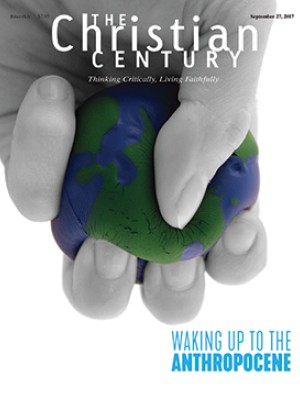October 22, Ordinary 29A (Matthew 22:15-22)
It's important to note what Jesus does not say about the Roman coin.
This week’s Gospel reading drops me into territory I don’t want to enter or navigate. Months into the Trump administration, I am tired, discouraged, bewildered, and afraid. I say this as a woman who finds the president’s misogyny inexcusable, as a person of color who is terrified by his casual racism, as a parent who cannot stomach the indecency my children are being exposed to, and as a daughter of immigrants who dares not take America’s welcome for granted.
But I also write in the full awareness that I have Christian friends, family members, and readers who hold radically different political views than I do—and to whom I owe every bit of love, respect, and faithfulness I can muster, quite apart from politics. So I’m struggling to find a way forward, struggling to do what Jesus asks of me in this week’s Gospel lesson: “Give to the emperor the things that are the emperor’s, and to God the things that are God’s.”
Read our latest issue or browse back issues.
On its face, this passage from Matthew’s Gospel is about taxation. The Pharisees and the Herodians attempt to entrap Jesus with a clever question: “Is it lawful to pay taxes to the emperor, or not?” The Pharisees see the tribute tax as a heretical and antinationalist capitulation to a pagan emperor, while the Herodians see refusing to pay the tax as sedition. Answering this yes-no question is a lose-lose proposition.
Instead, Jesus takes a Roman coin—a coin that honors the emperor as a deity—and offers his ambiguous both-and answer: “Give to the emperor the things that are the emperor’s, and to God the things that are God’s.” How typical of Jesus—not only to respond to a challenge with an even greater challenge but to insist that the relationship between faith and politics is too complex to reduce to platitudes or tweets.
It’s important to note what Jesus does not say. He doesn’t say that there are two distinct realms, the religious and the secular, and that they require our equal fidelity. What he says is more complicated: the coin is already the emperor’s—there’s his face stamped right on it—so give it to him. And then consider the harder question: What belongs to God? What kind of tribute do you owe him?
The Roman coins of Jesus’ day bore the image of the emperor. As human beings created by God, we bear God’s image. Which means, if we keep the analogy going, that we owe God everything—our whole and entire selves.
What can this mean in these hard days when families, communities, and churches are splintering over political and cultural differences that seem unbridgeable? When a scorched-earth, ideology-driven, “the end justifies the means” divisiveness reigns within American Christendom?
When I read the Gospels, I don’t see a Jesus who ever cares more about the end than the means. If anything, he privileges the means: the one who calls himself the Way understands that the way we go about achieving our goals—the language we use or abuse, the stories we privilege or silence, the people we protect or oppress, the sins we confess or indulge, the truths we proclaim or deny—makes all the difference in the world.
When I look to Jesus to think about how to practice my faith in the political realm, I see no path to glory that sidesteps humility, surrender, and sacrificial love. I see no permission to secure my prosperity at the expense of another’s suffering, no evidence that truth telling is optional. I see no kingdom that favors the contemptuous over the brokenhearted and no church that thrives for long when it aligns itself with power.
Christians have spilled much ink over America’s current political situation. Every argument and counterargument has been made ad nauseam, and as far as I can tell, no one—myself included—has the heart to listen to our opponents with genuine curiosity or compassion anymore. But maybe this is exactly the place where Jesus’ teaching becomes the sharpest and most relevant. As an image-bearer of a loving, forgiving, and gracious God, maybe what I owe God in this hour is the very grace and generosity he extends to me and to all of us.
Figuring out my taxes is the easy part. What’s much harder is living out my political convictions with a Christlike humility, with a compassion that embraces my political other as a brother or sister. But if I really belong to God, if I really am fashioned in God’s image, then I need to practice my faith and my politics in ways that reflect who God is—whether I like the current resident of the White House or not. It’s not a question of backing down, or of being dishonest, or of watering down my beliefs. It’s a question of remembering that the God whose image I bear is a God of love.
So yes, by all means give the emperor what belongs to him. But remember that our first debt is to a power that will remain long after earthly empires rise and fall. Our first and highest debt is to love.






